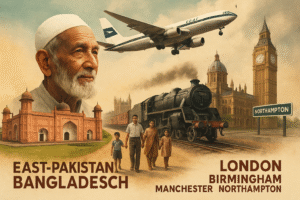The UK has a long and complex immigration history, with waves of migration from various parts of the world enriching its culture, economy, and society. Over the past two to three generations, diverse migrant communities have built lives here, contributing uniquely to the nation’s fabric. Each community brings its history, values, and legacy—a story crucial to understanding the UK’s cultural landscape. Documenting these stories, from the initial journey to settlement and integration, is essential for honouring the past and providing a treasure trove of knowledge for future generations.
Why It Matters to Document Heritage and Migration Journeys: A Source of Rich Educational Material
Documenting different communities’ migration journeys and heritage is vital for multiple reasons. First, it explains the historical and social contexts in which these migrations occurred, shedding light on why people choose to leave their homelands. Was it driven by economic need, political unrest, environmental issues, or personal aspirations? Each migrant story is a puzzle piece in the larger picture of global migration, and together, they help us understand the patterns that shape our modern world.
Secondly, for the migrant communities, these narratives are more than just stories; they are lifelines to cultural identity. For children and grandchildren of migrants, these documented histories serve as a bridge to their heritage, offering a glimpse into the customs, values, and ways of life their ancestors upheld. This knowledge nurtures a sense of belonging and pride and fosters a connection to a broader heritage that might otherwise be lost across generations.
The Journey of Migration: Challenges and Triumphs
Migration is a journey often filled with both hardships and triumphs. Initial migrants to the UK, particularly in the post-war period, faced language barriers, discrimination, and cultural alienation. Many struggled to secure employment and housing, often taking on jobs far below their qualifications to support their families. But despite these challenges, they persevered, built communities, and raised families who would go on to contribute to British society in innumerable ways.
It’s crucial to document these experiences not only to honour the struggles of these early migrants but also to understand the resilience that defined them. For instance, stories of South Asian, Caribbean, African, and Eastern European communities who arrived in the UK reveal common themes of overcoming adversity, building networks, and creating a home in a foreign land. Capturing these stories helps us appreciate the journey’s full breadth and the strength it takes to create a new life in an unfamiliar country, inspiring us with their resilience and determination.
Settlement and Integration: Building Communities
As migrant communities settled, they began to shape their neighbourhoods, contributing to developing vibrant, multicultural areas across the UK. From Southall’s rich Punjabi culture to Leicester’s strong Indian heritage, these communities became cultural hubs. Over the generations, they have balanced integration by preserving distinct cultural identities and creating unique hybrid cultures that enrich the national landscape.
The process of settlement and integration is complex and deserves thorough documentation. For the first generation, maintaining cultural traditions was a way to stay connected to their roots. The second generation often faced the dual challenge of balancing two cultures—their parents’ heritage and the British culture they grew up in. By the third generation, these families are often fully integrated into British society, yet still influenced by their heritage. These generational shifts offer valuable insights into the fluid nature of cultural identity and adaptation, making it essential to record this process in a way that highlights both the unity and diversity within communities.
Preserving Values, Legacy, and History: A Collective Responsibility
Migrants bring a rich tapestry of values, traditions, and customs contributing to the broader society. From traditional festivals and languages to culinary diversity and religious practices, these cultural expressions shape the communities and the cities and towns they inhabit. Recording these aspects of community life ensures that future generations can access and learn from them, even as they evolve.
Family unity, resilience, respect for elders, and community support are integral to many migrant cultures. These values have been passed down and integrated into British society in various ways. For instance, many migrant communities emphasize the importance of family gatherings, encouraging the preservation of traditional foods, music, and art forms. By documenting these legacies, we help ensure that such values are celebrated and remembered, fostering a more inclusive and understanding society.
Documenting the Ups and Downs: A Balanced Perspective
To truly understand the story of migrant communities, it’s important to document both the positive and negative experiences. While there are countless inspiring stories of achievement and success, many migrants have also faced racism, discrimination, and socio-economic challenges. Recording these difficulties provides a balanced perspective that is critical for future generations, helping them understand the resilience of their ancestors and the obstacles they overcame.
This balance is essential for meaningful historical documentation, as it highlights the realities of the migrant experience in the UK. For instance, the hostile environment policies and discrimination faced by the Windrush generation are significant parts of British history. Acknowledging these darker chapters enables us to learn from the past and build a more inclusive future, free from repeating the same mistakes, providing a more enlightened and informed perspective on our history.
The Role of Archiving and Creating a Repository
Archiving the stories, memories, and cultural artefacts of migrant communities is an essential step in preserving this heritage. Libraries, museums, and online repositories are crucial in collecting and preserving oral histories, photographs, personal documents, and other cultural artefacts. These archives serve as invaluable resources for researchers, historians, and future generations looking to understand the contributions of migrant communities to British society.
A dedicated repository or archive acts as a living history that continues to evolve as each new wave of migrants arrives and establishes roots. It allows communities to pass down their legacies in an organized, accessible way, ensuring these stories are available for future generations. In addition, these archives provide resources for community members and descendants seeking to learn more about their heritage and cultural identity, emphasizing the role of future generations in preserving and learning from this rich cultural heritage.
Why It’s a Treasure Trove for Future Generations
For the descendants of migrant families, understanding their heritage is a source of empowerment and pride. Knowing the stories of their ancestors allows them to connect with their past, learn from the resilience and adaptability of those who came before them, and navigate their own identities in a diverse world. The documentation and preservation of these stories become a treasure trove, offering a profound sense of continuity and legacy.
Moreover, future generations who might not have direct connections to these migrant communities can benefit from these histories, gaining insights into the rich diversity of British society. As the UK grows as a multicultural nation, understanding each other’s histories fosters empathy, respect, and a sense of unity, celebrating what makes each community unique while acknowledging their collective contribution to the country.
Conclusion: An Imperative for the Future
The history of migrant communities in the UK is one of resilience, adaptation, and enduring legacy. Documenting this journey—from initial migration to settlement, cultural preservation, and generational change—is essential for both the communities and the nation. It enriches the cultural heritage of the UK, creates a foundation of understanding for future generations, and ensures that the stories of those who contributed so much are not lost over time.
For Cohesive Society, preserving these stories aligns with our mission to build a more inclusive society by recognizing and celebrating the contributions of every community. We can keep these memories alive through research, documentation, and archiving, offering a vital resource for future generations. Let us preserve, celebrate, and learn from the past to build a brighter, more inclusive future for all.



